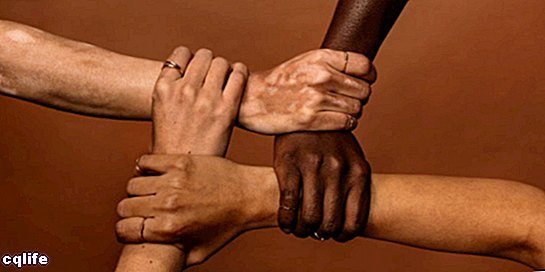- What is tolerance?
- Tolerance types
- Importance of tolerance
- Examples of tolerance
- Tolerance and intolerance
- Tolerance and respect
We explain what tolerance is, its types and its importance in our society. Also, examples and what is intolerance.

What is tolerance?
The word tolerance can have multiple meanings, which have the same aspect in common: that of admitting and supporting differences, that is, the opposite of extreme, violent, intolerant reactions.
For example, tolerance is called the ability of the human body to deal with certain substances without triggering an immune response, or also the margin of error that, when making a product, it is considered acceptable or natural of the same process.
However, the most common and important sense of this term is that of social tolerance, which is the ability of a society or a government to respect the ideas, preferences and behaviors from others, especially those from a different cultural, ethnic, or political background.
This last use of the word had its origin in France at the end of the 16th century, within the framework of the Wars from religion in which Catholics and Protestants clashed. Initially, it had a negative or pejorative meaning, since it expressed the obligation of the sides to admit the existence of the other, being unable to eradicate it by force.
However, in the 18th century the illustrated movement gave a much more positive meaning to the acceptance of beliefs others, and tolerance became one of the values fundamentals of the movement.
Today, tolerance is understood as the ability to live harmoniously between persons which come from contexts different cultures or ethnic groups, or professing different religions and political ideologies. It is one of the most promoted values worldwide, especially in the nations multicultural communities that receive significant waves of migration or refugees.
Tolerance types
We can talk about several types of tolerance, according to the specific area to which each one applies:
- Religious tolerance. That which refers to the permissiveness of the Condition regarding the practice of religions other than the official one, or the acceptance by a society of the values of a tradition mystical or religious minority. It is a characteristic of the nations that successfully separated church and state, not so of theocracies or fundamentalist regimes.
- Civil tolerance. It refers in this case to the acceptance of practices and behaviors considered contrary to ethics wave moral of the community majority, that is, of the one that holds and administers social control. Fundamentally, it is behavior that is frowned upon, but accepted because there is no viable alternative.
- Political tolerance. Political tolerance has to do with coexistence of different ideological forces within the same State, some exercising the government and others the opposition, without this leading to violent confrontations, persecution or illegalization, especially by those who hold political power.
Importance of tolerance
An Enlightenment philosopher such as John Locke (1632-1704), defended in his Letter on tolerance the importance of diversity ideas and a critical spirit, far from fanaticism, as a necessary element for progress. The Illustration sought tolerance as opposed to fanaticism religious and obscurantism spread by the Europe medieval.
Another philosopher of importance in the West, Claude Levi-Strauss (1908-2009), warned that progress is not exclusive to any cultureRather, it is precisely the fruit of the exchange and flourishing of different cultures. In this way, tolerance is a value that allows us to achieve an openness towards the other, understand and value their positions, without thinking of them as a threat to our own.
Levi-Strauss, however, was pessimistic on the matter, since intercultural friction and friction also generate enormous conflicts and confrontations, which to some extent seem to be unavoidable in the human being. However, appealing to reason is the only method that can channel these conflicts and turn them, in some way, in our favor.
In the intercultural and global world at the beginning of the 21st century, tolerance is both insistently exalted on the one hand. On the other hand, it is under attack from the most radical sectors of the nationalism, especially in nations that have hosted large numbers of refugees from other latitudes, such as those from the Middle East as a result of the string of bloody wars that since the end of the 20th century experiences the region.
Examples of tolerance

As will be seen below, not all cases of tolerance are morally admirable, at least by today's standards. Some historical examples of tolerance are:
- Tolerance of slavery. Slavery has a long and sad presence in history, but at the same time its critics have always existed: voices that opposed it and considered it immoral, who eventually triumphed. But slavery could survive for so many centuries because of the tolerance of those who were aware that it was a questionable practice, but supported that it was an economic activity like any other.
- Interreligious dialogue. Religions are known to preach the truth divine, and that for the most part they are intolerant of other creeds. This motivated wars and confrontations throughout history. However, there have been times when tolerance has reigned and there has been an enriching dialogue between religious traditions: between the Islam and Christianity, between Protestantism and Catholicism, etc. This is possible only if the right of the other to think that he or she is handling the truth is respected.
- Full democratic functioning. When a democracy it is healthy, in its political exercise political tolerance always reigns: there is no persecution of dissent, nor criminalization of protest, nor prohibition of militants, in general. This, however, implies a certain reciprocity: one cannot be tolerant with those who promote radicalization and intolerance, nor with those who aspire to reach the can to violate, precisely, democratic tolerance.
Tolerance and intolerance
The opposite of tolerance is, logically, intolerance. That is, the fierce and violent opposition to everything that is considered alien, wrong or unnatural, at variable levels that can range from active opposition, to persecution and extermination, depending on the case.
A clear example of intolerance was put into practice by the totalitarianisms of the 20th century: fascism and some forms of communism. They were regimes in which dissent was persecuted, imprisoned in concentration camps, and the sole ideological accusation was enough to put someone in problems.
Another example of intolerance is constituted by religious and fundamentalist groups that oppose civil measures such as the marriage between people of the same sex or the legalization of abortion.
Tolerance and respect
Although these two terms are often used interchangeably, they do not mean the same thing. On the one hand, tolerance implies acceptance of the other, that is, adopting a attitude foreign to the conduct of third parties, even though deep down we do not consider it correct or appropriate.
On the other hand, respect implies a more interested and understanding attitude, more willing to understand why the other does what he does or says what he says, and instead of tolerating him doing it, empathize with him, consider his motivations as valid as anyone's.
That is to say: respect arises when we go from simple tolerance, to the recognition of the other, giving and at the same time demanding a more empathetic, more human, and therefore, more egalitarian posture.
